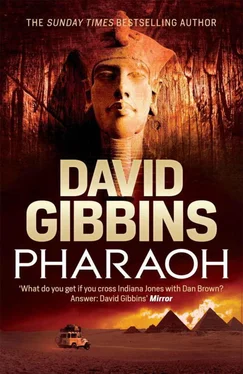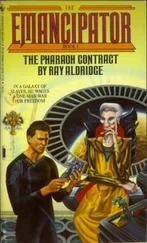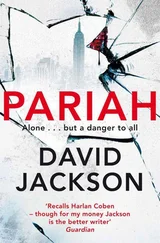‘His involvement has been kept in the strictest secrecy, because he has not wanted his name to be associated with a quest that some might see as mystical. But he has in truth been my staunchest supporter. He tried his damnedest to dissuade me from returning here, and his irritation with me has a genuine basis to it. He tried to persuade me that what I had sought could wait until the Mahdist revolt had dissipated and we could return to the Sudan peaceably, but I told him the revolt was never likely to end within our lifetimes, and the quest would be lost. I felt that if I could make a discovery that drew together one who was regarded as a Christian soldier and another an Islamist visionary, then there was hope for some unity of vision that might emphasise the singularity of our beliefs, not their differences, and make war less of a certainty.’
‘So you came out here for that purpose? For the archaeology?’
‘My purpose in coming out here was in truth as I have told you: to arrange for the safe passage of my staff and their families from Khartoum, and to do all I could for the people of this city. But my archaeological quest was not disassociated from my aim to lift the veil of conflict from this place, and to stem the jihad.’
‘Did you find the temple?’
‘Muhammad Ahmad showed me the place, and I set my people to work. The temple was deeply buried, and it took months of effort. By the time the inner chamber was revealed, Muhammad Ahmad was no longer part of the picture; he had become the Mahdi, and the centre of the whirlwind that envelops us now. It was only after I had discovered the wall carvings and brought them to the light of day, when his spies among my workmen reported back to him, that he understood what he had seen as a boy for what it was. It was not early writing or some ancient spell. It was a map.’
‘Did you show it to him?’
Gordon shook his head. ‘By then we were enemies. But he sent his followers after me, to try to take the carvings. I kept them here in the storerooms of the palace, hidden away, and eventually put them on the Abbas . To enthuse them, he let his followers believe that he was after gold, that I had found clues to some ancient El Dorado of the desert. Indeed, that is what the first pharaohs who came here thought too, seeking to extend the borders of Egypt beyond the desert but also hunting the oases and wells for evidence of an ancient civilisation, just as we do today. If they truly found their El Dorado we shall never know, for they were repelled by the warriors they called the guardians of the desert, savage fighters like the Ansar of the Mahdi today. In two places where Akhenaten went I have found depictions of battle against Egyptians in which these enemies are victorious, almost as if Akhenaten were leaving the images as a warning for others from Egypt not to follow him.’
Mayne thought for a moment. ‘The crocodile temple, where I saw the image of Akhenaten. It had just such a depiction of carnage in battle.’
Gordon leaned forward, his voice intense. ‘It was the hunt for ancient gold, treasure they believed I had hidden away for secret dispatch to Egypt, that led the Mahdi’s men to ransack the Abbas , diving repeatedly on the wreck to search for it. But little did they know that there was a far greater treasure concealed there, a treasure that the Mahdi had sent his emirs to discover when they waylaid and murdered Stewart and his men.’
Mayne looked at the crocodile symbol on the drawing, and suddenly remembered the channel that Lieutenant Tanner had discovered at the cataract, from the Nile to the crocodile temple. He studied the drawing again, seeing the interconnectedness of the lines, their origin at one source. ‘Do you remember at Chatham studying hydraulic engineering, looking at Venice and the island cities of northern India? This isn’t a labyrinth. It’s a complex of canals, some of them rising over the others. That entrance must lead from a water source, a river. I think the reason why this has never been found is that it’s underground.’
Gordon nodded. ‘Agreed. And I think the water source had to be a river, to keep enough volume flowing into a complex like this, and to keep it from stagnating.’
‘In this part of the world that can only mean the Nile.’
‘Agreed.’
‘Amarna, Akhenaten’s capital city?’
‘Schliemann and Chaille-Long explored the site exhaustively and found no evidence. They even employed divers using compressed air cylinders to inspect the edges of the river underwater, but they found no indication of a channel.’
Mayne was at a loss. ‘Somewhere out here in the desert?’
Gordon put his finger on the blank square in the centre of the drawing where the Aten sun-disc should have been. ‘Until we find that piece of the puzzle, we are floundering in the dark. I believe that there may have been something there, a depiction, a symbol, a hieroglyphic inscription, that might have given some indication. That’s what I’ve been out here searching for, scouring any site we find in the desert with connections to Akhenaten. That’s why Kitchener was so excited by your report of the crocodile temple. We believe there may have been clues in other depictions that Akhenaten had carved in these places. If this was his dream, then he would have wanted to indicate it somehow, his singular achievement.’
Mayne stared hard at the depiction. ‘But what was it, this place?’
Gordon’s eyes blazed. ‘A great city. An underground city.’
Mayne stared at the arms of the Aten. ‘A city of light.’
Gordon put his finger on the papyrus-scroll hieroglyph. ‘A city of knowledge . Schliemann and I spoke about it before he departed for Troy. He had a most remarkable suggestion. He posited that by doing away with the old priesthood, Akhenaten would have been liberating knowledge kept for countless generations in the temples of Egypt, written down on scrolls and passed on by word of mouth through the temple clerks, knowledge that the priests controlled and kept secret, knowledge that they could use sparingly when needed to enhance their prestige, to impress on the people the favour given by the gods to the priesthood. Schliemann is a student not only of Troy and Homer and the age of heroes but also of the very distant past, of the very beginnings of humanity before the first cities and the first priests. He believes that much knowledge of medicinal cures from those early times when humans lived close with nature had been lost by the time of the pharaohs, but not all of it. He thinks that Akhenaten may have wished to do away with the old temples, and to create one place that would be the only temple, one place to worship one God. And in it he would put all of that accumulated knowledge, a great compendium of it collected from the beginning of time.’
‘So not a city of knowledge,’ Mayne murmured. ‘A temple of knowledge.’
‘Do you see, Mayne? That is what I have been seeking. Here, in this city of the walking dead, whom I shall soon join.’
‘What would you have me do?’
‘Take my journal for the last days of Khartoum. It ends today; when I saw that you had arrived, I retrieved it from my bedroom and quickly finished it. See that it reaches Captain John Howard at the School of Military Engineering. Do you know him?’
Mayne nodded. ‘Kitchener told me he is to have charge of all the artefacts you send back.’
Gordon swept his hand around the room. ‘Sadly not including any of these. Everything here will be looted and destroyed. And the original carved panels are lost beneath the sands of the Nile.’
‘There may be hope one day,’ Mayne said. ‘When this land is free of the jihad, it may be possible to bring compressor divers to the spot.’
Читать дальше












